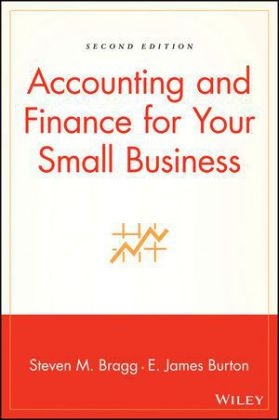
Accounting and Finance for Your Small Business
John Wiley & Sons Inc (Verlag)
978-0-471-77156-2 (ISBN)
"Once again, Bragg has turned his discerning eye and formidable talents on a topic and the results are outstanding. Both those new to the business and the long-established entrepreneur will benefit greatly when he joins forces with E. James Burton to produce this outstanding work."
—Mary S. Schaeffer, Editorial Director Accounts Payable Now & Tomorrow "I use the tips and practices found in [this book] all through the year. They are clear, direct, and efficient-which, in turn, improves our company and our bottom line. I recommend [this book] to anyone wanting to improve their own bottom line."
—D. R. Drum, CIO, CSO Engineering/Accounting, Dragon Moon Productions
"Eminently accessible, this book is a must-read for the entrepreneur, both new and established alike. Organizationally, the work flows smoothly and logically in a way that is valuable for the start-up as well as the veteran needing a refresher on specific aspects of the small business accounting/financing picture. I found particularly useful the rich resourcefulness that Messrs Burton and Bragg brought to the table in compiling the essential checklists for every conceivable corner of the entrepreneur's financial realm from fraud prevention to financing options. As a small business owner myself, I was well pleased with the real-world guidance and instant 'useability' this book offers."
—David Struthers, JDFacilitator/Trial Lawyer
"This book is essential for any small business owner, manager, or accountant's business tool kit. This easy-to-read book distills complex subject matter into meaningful and understandable information and is a great refresher course for those deeply involved in the accounting and financial matters of a small business. The book contains many examples that can be used immediately in daily operations to improve the quality of information for better decision making. The book provides those involved in small business the framework to manage what they measure."
—Jim Bologa, CFODaticon, Inc.
Steven Bragg, CPA, CMA, CIA, CPIM, has been the chief financial officer or controller of four companies, as well as a consulting manager at Ernst & Young and auditor at Deloitte & Touche. He received a Master’s degree in finance from Bentley College, an MBA from Babson College, and a Bachelor’s degree in Economics from the University of Maine. He has been the two-time president of the Colorado Mountain Club, is an avid alpine skier and mountain biker, and is a certified master diver. Subscribe to Steve’s free best practices newsletter at www.stevebragg.com E. James Burton, Ph.D., CPA, CFE, is dean of the College of Business and a full professor of accounting at Middle Tennessee State University. He has founded, owned, managed, and sold a number of businesses in a variety of areas from service to manufacturing. He received a Bachelor of Arts degree from MacMurray College in economics/business, a Master of Business Administration degree from Murray State University in management, and a Ph.D. in accountancy from the University of Illinois at Urbana-Champaign. In addition to over 50 journal articles, he has written Total Business Planning: A Step-by-Step Guide with Forms that has continued through three editions and translation into Norwegian. He resides in Murfreesboro, Tennessee.
Preface xiii
Section I Preparing to Operate the Business 1
Chapter 1 Budgeting for Operations 3
Definition or Purpose of an Operating Budget 3
Signs of Budget Ineffectiveness 4
Improvements to the Budgeting System 6
Responsibility Accounting 9
Budget Tracking and Maintenance 21
The System of Interlocking Budgets 25
Need for Budget Updating 35
Summary 36
Chapter 2 Investing in Long-Term Assets and Capital Budgeting 39
Definitions 40
Overview and Use of Capital Budgeting 41
Life Cycles 42
Capital Budgeting Sequence 43
Producing Numbers to Get Dollars, the Use of Forms, and the Capital Budgeting Model 48
Miscellaneous Considerations 65
Product Discontinuance 66
Bailout 68
Summary 69
Appendix: Examples and Comparison of Calculations 70
Chapter 3 Basic Control Systems 77
The Need for Control Systems 77
Types of Fraud 79
Key Controls 81
When to Eliminate Controls 97
Summary 99
Section II Operating the Business 101
Chapter 4 Cash Flow Concerns 103
Cash 103
What to Do with Excess Cash 105
Cash Flows 108
Introduction to Cash Flow Budgets 112
Indications of Cash Flow Problems 112
Managing Cash 113
Preparation of the Cash Budget 126
Disbursements 127
Net Cash Flow and Cash Balances 130
Exceptions to Expected Cash Flows 131
Summary 132
Appendix: Cash Flow Example 133
Chapter 5 Financing 143
New Businesses 143
Zero Working Capital and Zero Fixed Assets 144
Types of Financing 148
Private Placement of Stock 157
Swapping Stock for Expenses 158
Stock Warrants 159
Stock Subscriptions 159
How to Obtain a Bank Loan 160
Sources of Debt Financing 167
Types of Loan Arrangements 168
Restrictions on Loans 171
Conditions That a Borrower Should Seek 173
Summary 175
Section III Evaluating the Operations of the Business 177
Chapter 6 Performance Measurement Systems 179
Financial Ratios 180
Types of Financial Ratios 182
Using Performance Measurements for Predictions 193
Operating Ratios 196
Other Ratios 202
The Balanced Scorecard 204
Summary 207
Chapter 7 Financial Analysis 209
Risk Analysis 209
Capacity Utilization 215
Breakeven Analysis 222
Summary 229
Chapter 8 Taxes and Risk Management 231
Controlling Tax Liabilities 232
Risk Management 237
Insurance 245
Types of Insurance Companies 249
Claims Administration 250
Summary 252
Chapter 9 Reporting 255
Federal Government Requirements 255
State Government Requirements 262
Local Government Requirements 267
Creditors 268
Equity Holders 269
Management Reports 269
Summary 286
Index 289
| Erscheint lt. Verlag | 28.2.2006 |
|---|---|
| Zusatzinfo | Exhibits: 42 B&W, 0 Color |
| Verlagsort | New York |
| Sprache | englisch |
| Maße | 185 x 256 mm |
| Gewicht | 753 g |
| Einbandart | gebunden |
| Themenwelt | Wirtschaft ► Betriebswirtschaft / Management ► Planung / Organisation |
| Wirtschaft ► Betriebswirtschaft / Management ► Rechnungswesen / Bilanzen | |
| ISBN-10 | 0-471-77156-2 / 0471771562 |
| ISBN-13 | 978-0-471-77156-2 / 9780471771562 |
| Zustand | Neuware |
| Informationen gemäß Produktsicherheitsverordnung (GPSR) | |
| Haben Sie eine Frage zum Produkt? |
aus dem Bereich


